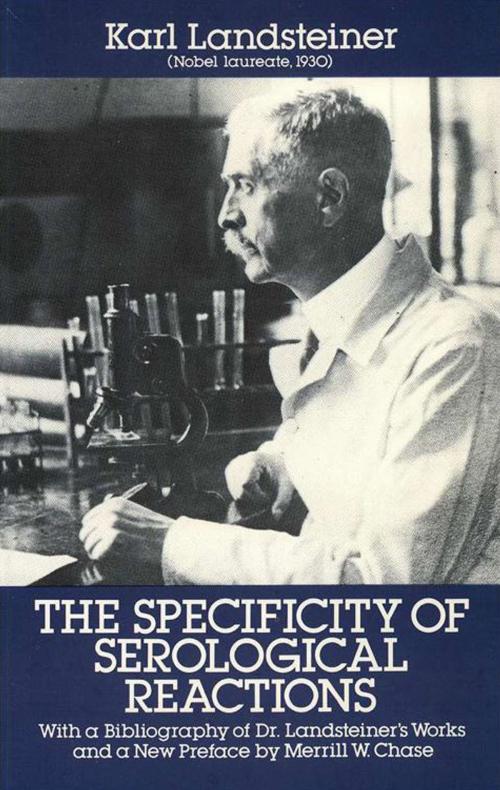The Specificity of Serological Reactions
Nonfiction, Science & Nature, Science, Biological Sciences, Biology| Author: | Karl Landsteiner | ISBN: | 9780486151441 |
| Publisher: | Dover Publications | Publication: | September 25, 2013 |
| Imprint: | Dover Publications | Language: | English |
| Author: | Karl Landsteiner |
| ISBN: | 9780486151441 |
| Publisher: | Dover Publications |
| Publication: | September 25, 2013 |
| Imprint: | Dover Publications |
| Language: | English |
Since the discovery that each particular antibody in the blood tends to react primarily with one specific antigen among the hundreds that can be introduced into the system, great strides have been made toward the elimination of disease through immunization. The late Dr. Karl Landsteiner, winner of the Nobel Price in 1930 for the discovery of human blood groups, devoted his life to fundamental research and played a guiding role in the development of several important branches of immunology. This authoritative study is an account of the experiments he and his colleagues carried out on antigens and serological reactions with simple compounds.
Beginning with a general discussion of the phenomena of serological specificity, with the emphasis chiefly on the chemical aspects of those reactions that involve immunization, Dr. Landsteiner goes on to cover the topics of natural antigens and antibodies, artificial conjugated antigens, and the reactivity of simple chemical compounds, the chemistry of specific non-protein cell substances, and the developments in our knowledge of serological reactions from a physico-chemical approach. Included in the discussion are his original and fundamental studies in hypersensitivity to chemical allergens and his work with "haptens," on which modern immunochemistry has leaned very heavily. The final chapter, written by Dr. Linus Pauling, carefully presents the principles of molecular structure and intermolecular forces.
An extremely valuable feature of this book is the massive bibliography compiled by the author — over 2,100 items are listed at the chapter ends. A further aid to study and research is the definitive bibliography of Dr. Landsteiner's own writings, new to this edition, and reprinted through the courtesy of the Journal of Immunology.
The beginner and advanced student alike will find nowhere else the breadth of coverage given here to basic concepts of immunology. Comprehensive enough for the use of the worker in the field, the book also provides, primarily in an introductory section, explanations and definitions of elementary terminology, concepts, and phenomena of serology for those unacquainted with the subject.
Since the discovery that each particular antibody in the blood tends to react primarily with one specific antigen among the hundreds that can be introduced into the system, great strides have been made toward the elimination of disease through immunization. The late Dr. Karl Landsteiner, winner of the Nobel Price in 1930 for the discovery of human blood groups, devoted his life to fundamental research and played a guiding role in the development of several important branches of immunology. This authoritative study is an account of the experiments he and his colleagues carried out on antigens and serological reactions with simple compounds.
Beginning with a general discussion of the phenomena of serological specificity, with the emphasis chiefly on the chemical aspects of those reactions that involve immunization, Dr. Landsteiner goes on to cover the topics of natural antigens and antibodies, artificial conjugated antigens, and the reactivity of simple chemical compounds, the chemistry of specific non-protein cell substances, and the developments in our knowledge of serological reactions from a physico-chemical approach. Included in the discussion are his original and fundamental studies in hypersensitivity to chemical allergens and his work with "haptens," on which modern immunochemistry has leaned very heavily. The final chapter, written by Dr. Linus Pauling, carefully presents the principles of molecular structure and intermolecular forces.
An extremely valuable feature of this book is the massive bibliography compiled by the author — over 2,100 items are listed at the chapter ends. A further aid to study and research is the definitive bibliography of Dr. Landsteiner's own writings, new to this edition, and reprinted through the courtesy of the Journal of Immunology.
The beginner and advanced student alike will find nowhere else the breadth of coverage given here to basic concepts of immunology. Comprehensive enough for the use of the worker in the field, the book also provides, primarily in an introductory section, explanations and definitions of elementary terminology, concepts, and phenomena of serology for those unacquainted with the subject.















